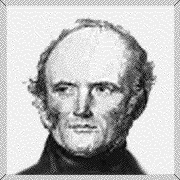 Sir
Charles Lyell was born in Scotland on November 12,
1797. He studied at Oxford University. After graduation he traveled
throughout Europe observing geological formations. Later he traveled
to the United States of America and continued his field work.
Sir
Charles Lyell was born in Scotland on November 12,
1797. He studied at Oxford University. After graduation he traveled
throughout Europe observing geological formations. Later he traveled
to the United States of America and continued his field work.
He is remembered for his book, Principles of Geology, which presented his theory of uniformitariansim. Uniformitarianism is a theory which holds that the Earth's history is explained by gradual change over time. That geological processes going on today have occurred in the past and have shaped the Earth's surface. His writings deal with the rock cycle, which explains how one type of rock is transformed into another. He also deals with volcanic forces, deposition, erosion, and paleontology in his writings. His work helped to establish the modern study of geology and geologic time.
In addition to his work on rock formation, he also dealt with paleontology (the study of ancient life). He proposed the idea of reference fossils - fossils which are indicative of certain periods of geologic time. He divided geologic time into four periods: Pleistocene, Older Pliocene, Miocene and Eocene.
Lyell died on February 22, 1875.
References
Asimov, I. (1964). Asimov's Biographical Encyclopedia of Science and Technology: The Living Stories of More than 1000 Great Scientists from the Age of Greece to the Space Age Chronologically Arranged. Garden City, NY: Doubleday.
Daintith, J., Mitchell, S., & Tootill, E. (1981). A Biographical Encyclopedia of Scientists. New York: Facts on File.
Howard, A.V. (1951). Chamber's Dictionary of Scientists. London: Chambers.
Ireland, N.O. (1962). Index to Scientists of the World, from Ancient to Modern Times: Biographies and Portraits. Boston, MA: Faxon.
McGraw-Hill (1966). McGraw-Hill Modern Men of Science. New York: McGraw-Hill.